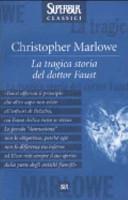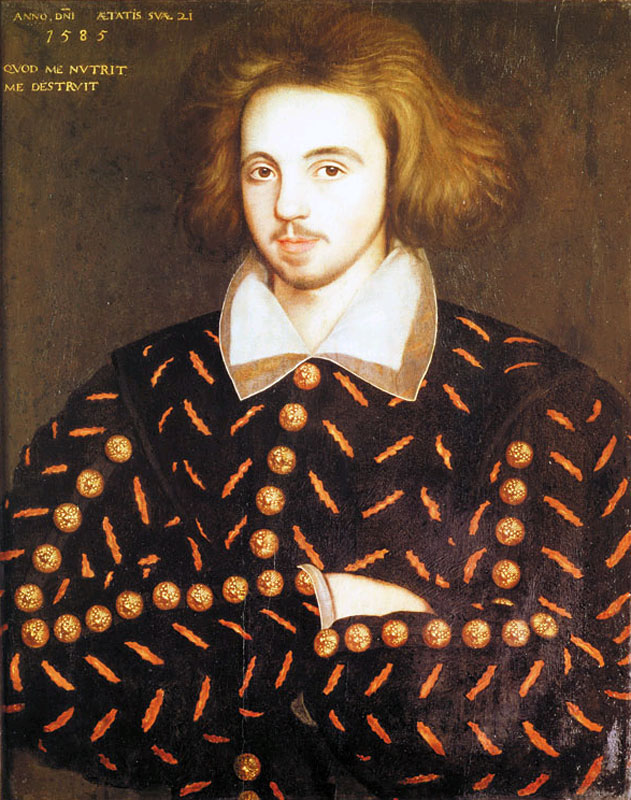Lavori

La tragica storia del Dottor Faust
Christopher MarloweChristopher Marlowe frasi celebri
Dr. Faustus
Frasi su stelle di Christopher Marlowe
“Le stelle ruotano, il tempo corre, l'orologio | suonerà, verrà il demonio e Faust sarà dannato.”
Christopher Marlowe, Il Dottor Faust, traduzione di Nemi D'Agostino, Ugo Guanda editore, 1980, atto V, scena II, vv. 1936-1937
La tragica storia del Dottor Faust
“Voi stelle che regnaste alla mia nascita, La cui influenza ha disposto la morte e l'inferno.”
You stars that reign'd at my nativity, Whose influence hath allotted death and hell.
La tragica storia del Dottor Faust
'Faustus: "O lente, lente currite, noctis equi!"<br ></ref> The stars move still, time runs, the clock will strike,
The devil will come, and Faustus must be damn'd.
O, I'll leap up to my God! — Who pulls me down? —
See, see, where Christ's blood streams in the firmament!
One drop would save my soul, half a drop: ah, my Christ! —
Ah, rend not my heart for naming of my Christ!
Yet will I call on him: O, spare me, Lucifer! —
Where is it now? 'tis gone: and see, where God
Stretcheth out his arm, and bends his ireful brows!
La tragica storia del Dottor Faust, Atto V, Scena II
Origine: Verso ripreso da: Ovidio (Amores, I, 13, 40) (1994)
Christopher Marlowe Frasi e Citazioni
da La triste storia del dottor Faust; citato in Jean Rocchi, Giordano Bruno davanti all'inquisizione, Stampa Alternativa
La tragica storia del Dottor Faust
da Lust's Dominion, III, 4; citato in Giuseppe Fumagalli, Chi l'ha detto?, Hoepli, 1921, p. 296
Faust, atto II, scena VIII
La tragica storia del Dottor Faust
Origine: Da Il dottor Faustus http://www.readme.it/libri/3/3010020.shtml, readme.it.
“Era quello il volto che causò l'invio di migliaia di navi? E fe' bruciar le torri eccelse d'Ilio?”
citato in Dizionario Oxford della letteratura inglese http://books.google.it/books?id=JYWzOHQR_jwC&pg=PA287&dq=Era+quello+il+volto+che+caus%C3%B2+l'invio+di+migliaia+di+navi&hl=it&ei=g2NuTIvCKuGT4ganr7GsCw&sa=X&oi=book_result&ct=result&resnum=1&ved=0CCsQ6AEwAA#v=onepage&q=Era%20quello%20il%20volto%20che%20caus%C3%B2%20l'invio%20di%20migliaia%20di%20navi&f=false
La tragica storia del Dottor Faust
'Faustus: Ah, Faustus,
Now hast thou but one bare hour to live,
And then thou must be damn'd perpetually!
Stand still, you ever-moving spheres of heaven,
That time may cease, and midnight never come.
La tragica storia del Dottor Faust, Atto V, Scena II
'Faustus: Curs'd be the parents that engender'd me!
No, Faustus, curse thyself, curse Lucifer
That hath depriv'd thee of the joys of heaven.
La tragica storia del Dottor Faust, Atto V, Scena II
“Solo un cretino può dire di non amare il tabacco e i ragazzi.”
citato in Luca Fontana, Come il sodomita diventò gay, in Il secolo gay, Diario del mese, gennaio 2006, p. 14
Attribuite
Christopher Marlowe: Frasi in inglese
“Now will I show myself to have more of the serpent than the dove”
Barabas, Act II, scene iii. Marlowe is referencing Jesus, "Be ye therefore wise as serpents, and harmless as doves," in Matthew 10:16.
The Jew of Malta (c. 1589)
Contesto: Now will I show myself to have more of the serpent than the dove; that is, more knave than fool.
“Pluck up your hearts, since fate still rests our friend.”
Aeneas, Act I, scene i, line 149
Dido (c. 1586)
“Thou hast committed—
Fornication: but that was in another country;
And besides, the wench is dead.”
Friar Barnardine and Barabas, Act IV, scene i
The Jew of Malta (c. 1589)
“Love me little, love me long.”
Ithamore, Act IV. Quoting John Heywood, "Love me litle, love me long," in Proverbes (c. 1538), Part ii, Chapter ii.
The Jew of Malta (c. 1589)
Barabas, Act I, scene i. Paraphrasing John Heywood, "Here lyeth muche rychnesse in lytell space," in The Foure PP https://books.google.com/books?id=LbkVAAAAYAAJ&printsec=frontcover&source#v=onepage&q&f=false (c. 1530).
The Jew of Malta (c. 1589)
“Hell is just a frame of mind.”
Origine: Dr. Faustus
“He that loves pleasure, must for pleasure fall.”
Evil Angel, Act V, scene iv
Origine: Doctor Faustus (c. 1603)
“Fools that will laugh on earth, most weep in hell.”
Origine: Doctor Faustus
“Who ever loved that loved not at first sight?”
First Sestiad. The same statement occurs in As You Like It (1600) by William Shakespeare, and a similar one in The Blind Beggar of Alexandria (1596) by George Chapman.
Hero and Leander (published 1598)
Variante: Where both deliberate, the love is slight; Who ever loved, that loved not at first sight?
Mephistopheles, Act II, scene i, line 118
Doctor Faustus (c. 1603)
Origine: Dr. Faustus
“Come live with me and be my Love,
And we will all the pleasures prove”
Origine: The Complete Plays and Poems
Faustus, Act V, scene i, lines 91–93
Doctor Faustus (c. 1603)
Origine: The Tragical History of Dr. Faustus
“What art thou Faustus, but a man condemned to die?”
Origine: Dr. Faustus
“The stars move still, time runs, the clock will strike”
Origine: Dr. Faustus
Origine: The Tragical History of Dr. Faustus
“What should a priest do with so fair a house?
A prison may best beseem his holiness.”
Gaveston, Act I, scene i, lines 204–205
Edward II (c. 1592)
The Passionate Shepherd to His Love (unknown date), stanzas 1 and 2. Compare: "To shallow rivers, to whose falls / Melodious birds sings madrigals; / There will we make our peds of roses, / And a thousand fragrant posies", William Shakespeare, Merry Wives of Windsor, act iii. scene i. (Sung by Evans.)
